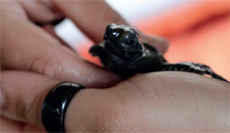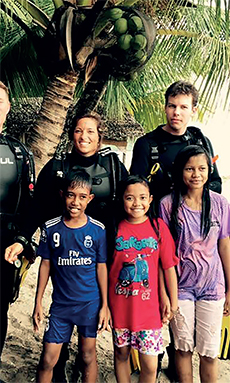




| Home | Features | Club Nights | Underwater Pics | Feedback | Non-Celebrity Diver | Events | 8 August 2025 |
| Blog | Archive | Medical FAQs | Competitions | Travel Offers | The Crew | Contact Us | MDC | LDC |

|

|
 
 |
   ISSUE 22 ARCHIVE - WAKATOBI NATIONAL MARINE PARKChantelle WyattOperation Wallacea was first introduced to me at a dive school I once worked for. I dealt with university students who were soon to be off on 'OpWall' adventures and who needed to buy dive kit to head off with.I decided to check out the projects myself after being keen on everything that I had heard about the organisation and the conservation contributions they were seen to be making. I got in touch with a fabulous lady called Pippa Mansell, Manager at the Coral Reef Research Unit at the University of Essex, site manager on Hoga Island marine search station and Co-Pl for communities in the Seychelles with capacity development for the Earthwatch Institue. I organised to fly out and take part in some teaching in Indonesia and the heart of the OpWall projects that were running in the middle of the coral triangle in the centre of the Wakatobi National Marine Park. The organisation itself is a network of academics from European and North American universities, who design and implement biodiversity and conservation management research programmes. Research is supported by students who join the programme, to strengthen their CV or resume or collect data for a dissertation or thesis. Academics benefit from funding for high quality fieldwork enabling them to publish papers in peer reviewed journals. This model enables the collection of large temporal and spatial datasets used for assessing the effectiveness of conservation management interventions. I arrived as contracted Scuba Dive instructor to teach open water and advanced courses primarily to the huge groups of international schools arriving weekly on Hoga island. The weeks, from a teaching perspective, ran exceptionally well. The project was well organised and it was a pleasure to introduce scuba to what could turn out to be the next generation of marine scientists and conservationists. Alongside my courses a coral reef ecology course ran and enabled students to learn about and identify what they were seeing on their dives. A great introduction into marine education. The individuals that ran the courses were informed, passionate and patient which blended a perfect combination. A main interest of mine was to find out about how students study the restoration and management of overfished coral reefs, which was a task that involved registration of all local fisherman and looking at opportunities for other livelihoods to be developed for people to find new ways to gain a good income. As part of this I accompanied one of the PHD students to Darawa, a local village in the Wakatobi, not far from Hoga island where I was based. We looked at alternative means to generate income. Seaweed and agar farming were popular here and despite in place for a considerable amount of time, the process doesn't make the local people as much money as it could if the products could be refined in the Wakatobi before being sold on. We were taken out to the farming areas and the locals provided us with numerous amounts of question and answer time via a translator. People work hard in these areas and the sense of community was big. Seaweed hung drying all over the village and the water was busy with small boats coming in and out loaded with fresh weed to be sorted. A local man told us that his children learnt how to farm for seaweed at 7 years old. This kind of trade makes you realise how fast young people grow up in impoverished areas. Despite saying this the village was thick with cultural richness and warm, welcoming, smiley faces, a pleasure to have experienced. So back to the diving, exceptional is the only word that can be used to describe it. Ledgendary underwater explorer and conservationist, Jacques Cousteau is said to have called the Wakatobi islands- then known as the Tukangbesi islands: "An underwater Nirvana." Located in the heart of the Asia-Pacific Coral Triangle, in the province of South East Sulawesi, the Wakatobi islands are full of crystal clear, pristine waters, hugely rich and diverse. The Wakatobi alone is said to have over 900 fish species and over 700 coral reef species. A true diving and research mecca for anyone with a love of the underwater world. My trip extended with Opwall out to the island of Tomia on their personally run liveaboard, the Bintang. We sailed through the marine park and arrived in at this lush island, quiet and almost surreal we spent a week waking up early and plunging it to what has to be some of my most rated diving. The waters were flourishing and colour and fish jumped out at you at every glance. Manta shrimps, nudi brands, barracuda, bump head parrot fish, lion fish, clown fish, damsels, bat fish spun past us in this busy fish city. Opwall supports an array of people with a vast amount and extended amount of research and truly manages all of this in a safe and controlled environment with opportunity to come back year after year as staff or a student to fully embrace all that the Wakatobi has to offer. It is still mostly untouched and so worth seeing for yourself. |